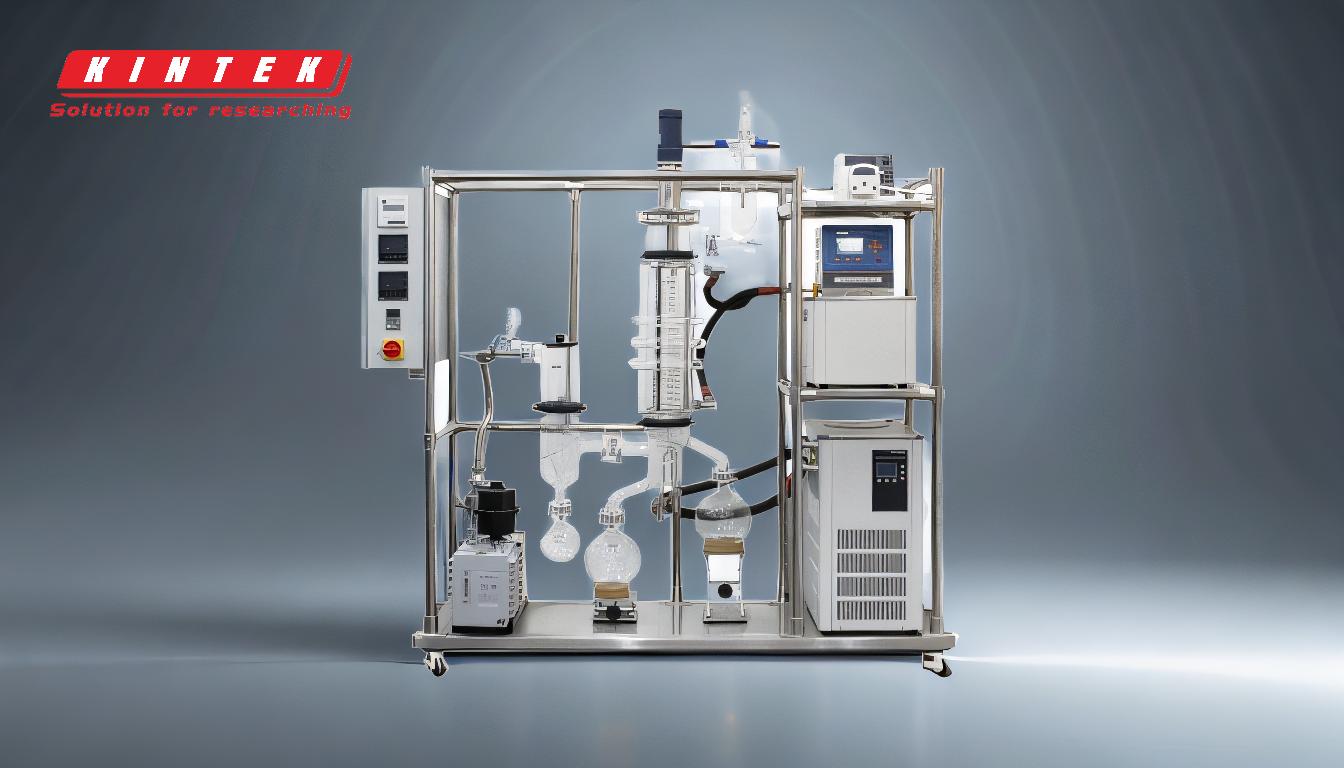The distillation process in the pharmaceutical industry is a critical method for separating, purifying, and concentrating compounds used in drug manufacturing. It employs specialized techniques such as vacuum distillation, short path distillation, and molecular distillation to handle heat-sensitive materials and achieve high purity levels. These methods are essential for producing active pharmaceutical ingredients (APIs), vitamins, and other compounds like amino acid esters, polymer intermediates, and skincare products. The process involves precise control of temperature, pressure, and equipment setup to ensure the integrity of sensitive compounds and the efficiency of separation. Below, we explore the key aspects of these distillation methods and their applications in the pharmaceutical industry.
Key Points Explained:

-
Types of Distillation Used in the Pharmaceutical Industry:
-
Vacuum Distillation:
- This method is used to separate and purify liquids with high boiling points or those that are heat-sensitive. By reducing the pressure, the boiling point of the liquid is lowered, preventing thermal degradation.
- Applications: Processing heat-sensitive compounds, purifying high-boiling-point liquids, and ensuring high-purity outputs.
-
Short Path Distillation:
- A specialized form of distillation where the distance between the evaporator and condenser is minimized to reduce the exposure of compounds to high temperatures.
- Applications: Production of amino acid esters, polymer intermediates, vitamin E, and other heat-sensitive compounds.
-
Molecular Distillation:
- Also known as short path distillation, this technique is used for compounds that degrade at temperatures above 250°C. It is ideal for organic and silicon-based compounds.
- Applications: Solvent swapping, separation of chemical compounds, crystallization, purification from volatile impurities, and drying from water. It is crucial in producing medicines like penicillin, aspirin, and topical ointments.
-
Vacuum Distillation:
-
Key Applications in the Pharmaceutical Industry:
-
Production of APIs and Vitamins:
- Distillation is used to purify and concentrate active pharmaceutical ingredients (APIs) and vitamins, such as vitamin E, which is widely used in skincare products.
-
Solvent Swapping and Purification:
- Molecular distillation is employed to remove solvents and volatile impurities, ensuring the final product meets stringent purity standards.
-
Heat-Sensitive Compound Processing:
- Techniques like short path and molecular distillation are essential for processing compounds that cannot withstand high temperatures without degradation.
-
Production of APIs and Vitamins:
-
Equipment and Setup:
-
Boiling Flask and Condenser:
- The boiling flask contains the mixture to be distilled, while the condenser cools and condenses the vapor back into liquid form.
-
Vacuum System:
- A vacuum pump is used to reduce pressure, enabling distillation at lower temperatures.
-
Heating and Stirring:
- Precise temperature control (e.g., 60°C) and stirring (e.g., 200 RPM) are critical to initiate and maintain the distillation process. Insulation may be used to optimize heat distribution.
-
Boiling Flask and Condenser:
-
Operational Considerations:
-
Temperature Control:
- Maintaining the correct temperature is crucial to prevent degradation of heat-sensitive compounds. Analog or digital heating mantles are used for this purpose.
-
Pressure Management:
- The vacuum system must be carefully controlled to achieve the desired boiling point reduction.
-
Observation and Adjustment:
- Operators must monitor the reaction and make adjustments (e.g., increasing heat slightly) if the distillation process is too slow or inefficient.
-
Temperature Control:
-
Benefits of Distillation in Pharmaceuticals:
-
High Purity:
- Distillation ensures the removal of impurities, resulting in high-purity compounds suitable for pharmaceutical use.
-
Versatility:
- Different distillation methods can be tailored to handle a wide range of compounds, from APIs to vitamins and skincare ingredients.
-
Efficiency:
- Techniques like short path distillation minimize processing time and energy consumption while maximizing yield.
-
High Purity:
In summary, distillation in the pharmaceutical industry is a versatile and essential process for producing high-purity compounds. By leveraging specialized techniques like vacuum, short path, and molecular distillation, manufacturers can safely and efficiently handle heat-sensitive materials, ensuring the quality and efficacy of pharmaceutical products.
Summary Table:
| Aspect | Details |
|---|---|
| Types of Distillation | - Vacuum Distillation: Lowers boiling points for heat-sensitive compounds. |
| - Short Path Distillation: Minimizes temperature exposure for sensitive materials. | |
| - Molecular Distillation: Ideal for compounds degrading above 250°C. | |
| Applications | - Production of APIs, vitamins, and skincare products. |
| - Solvent swapping, purification, and heat-sensitive compound processing. | |
| Equipment | - Boiling flask, condenser, vacuum system, and precise heating/stirring. |
| Operational Factors | - Temperature control, pressure management, and real-time adjustments. |
| Benefits | - High purity, versatility, and efficiency in compound processing. |
Learn how distillation can enhance your pharmaceutical production—contact our experts today!










